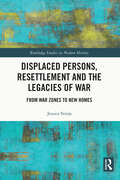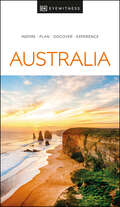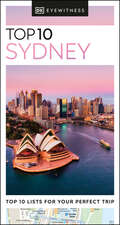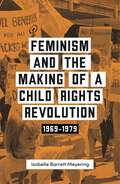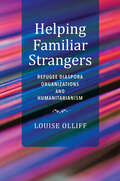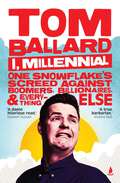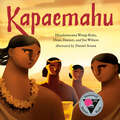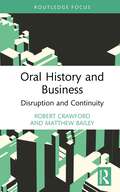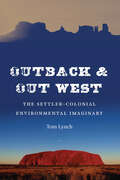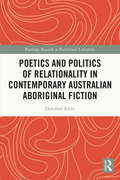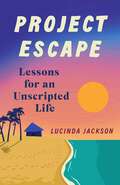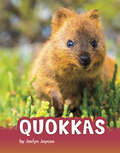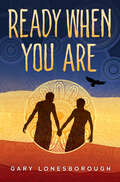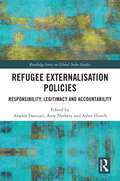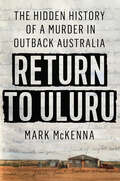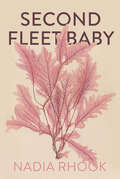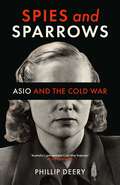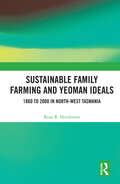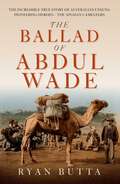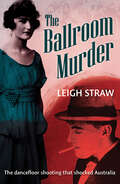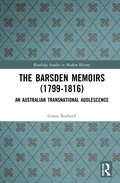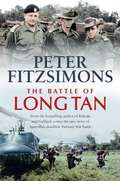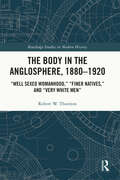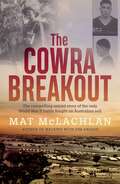- Table View
- List View
Displaced Persons, Resettlement and the Legacies of War: From War Zones to New Homes (Routledge Studies in Modern History)
by Jessica StrojaThis book provides a case study on the ongoing impact of displacement and encampment of refugees who do not have access to resettlement support services, or are resettled in locations of low cultural and linguistic diversity. Following the journeys of displaced families and children who left Europe after the Second World War to seek resettlement in Queensland, Australia, this book brings together the rarely heard voices of these refugees from written archives, along with material from more than 50 oral history interviews. It thoroughly explores the impacts of displacement, encampment and eventually resettlement in locations without resettlement facilities or support networks. In so doing, the book brings to light important findings that can be used to help understand the experiences of those impacted by contemporary refugee crises, and can be considered when developing responses and assistance in locations where there is a lack of diversity or support for refugees. This book will be of interest to scholars and students studying and researching the history of migration, sociology of migration, psychological effects of migration and displacement, as well as demography. Practitioners and policy makers will also be able to draw from this book when considering the long-term impacts of responses to contemporary refugee crises.
Eyewitness Australia (Travel Guide)
by DK EyewitnessWhether you want to enjoy a spectacular sunrise at Uluru-Kata Tjuta National Park, sip craft beer in one of Melbourne&’s many hidden bars or drive along the epic Great Ocean Road, your DK Eyewitness travel guide makes sure you experience all that Australia has to offer.Australia's scintillating cities are home to world-class galleries, burgeoning foodie scenes and a lively nightlife. Beyond the urban landscape lie some of the most diverse natural wonders on earth. From the sun, sand and surf of Australia&’s 10,000 beaches and tropical islands to the World Heritage-listed rainforests, underwater coral gardens and hauntingly beautiful arid interior – this epic landscape never fails to mesmerize and surprise.Our updated guide brings Australia to life, transporting you there like no other travel guide does with expert-led insights, trusted travel advice, detailed breakdowns of all the must-see sights, photographs on practically every page, and our hand-drawn illustrations which place you inside the country's iconic buildings and neighborhoods. We&’ve also worked hard to make sure our information is as up-to-date as possible following the COVID-19 outbreak. DK Eyewitness Australia is your ticket to the trip of a lifetime. Inside DK Eyewitness Australia you will find: - A fully-illustrated top experiences guide: our expert pick of Australia&’s must-sees and hidden gems- Accessible itineraries to make the most out of each and every day- Expert advice: honest recommendations for getting around safely, when to visit each sight, what to do before you visit, and how to save time and money- Color-coded chapters to every part of Australia, from Queensland to New South Wales, Tasmania to Victoria- Practical tips: the best places to eat, drink, shop and stay- Detailed maps and walks to help you navigate the country easily and confidently - Covers: Sydney, New South Wales, Canberra and Australian Capital, Territory, Victoria Tasmania, South Australia, Queensland, Northern Territory, Western AustraliaOnly visiting Sydney? Look out for DK Eyewitness Sydney or the pocket-sized Top 10 Sydney.About DK Eyewitness: At DK Eyewitness, we believe in the power of discovery. We make it easy for you to explore your dream destinations. DK Eyewitness travel guides have been helping travellers to make the most of their breaks since 1993. Filled with expert advice, striking photography and detailed illustrations, our highly visual DK Eyewitness guides will get you closer to your next adventure. We publish guides to more than 200 destinations, from pocket-sized city guides to comprehensive country guides. Named Top Guidebook Series at the 2020 Wanderlust Reader Travel Awards, we know that wherever you go next, your DK Eyewitness travel guides are the perfect companion.
Eyewitness Top 10 Sydney (Pocket Travel Guide)
by DK EyewitnessOverlooking one of the world&’s most spectacular harbours, Sydney is blessed with ocean beaches, lush tropical gardens, and a balmy climate that makes the great outdoors irresistible.Make the most of your trip to this dazzling city with DK Eyewitness Top 10. Planning is a breeze with our simple lists of ten, covering the very best that Sydney has to offer and ensuring that you don&’t miss a thing. Best of all, the pocket-friendly format is light and easily portable; the perfect companion while out and about. DK Eyewitness Top 10 Sydney is your ticket to the trip of a lifetime. Inside DK Eyewitness Top 10 Sydney you will find: - Top 10 lists of Sydney&’s must-sees, including Sydney Opera House, Art Gallery NSW, Darling Harbour and Bondi Beach- Sydney&’s' most interesting areas, with the best places for sightseeing, food and drink, and shopping- Themed lists, including the best beaches, museums, art galleries, parks and gardens and much more- Easy-to-follow itineraries, perfect for a day trip, a weekend, or a week- A laminated pull-out map of Sydney, plus eight full-color area mapsLooking for more on Australia&’s culture, history and attractions? Try our DK Eyewitness Australia.About DK Eyewitness: At DK Eyewitness, we believe in the power of discovery. We make it easy for you to explore your dream destinations. DK Eyewitness travel guides have been helping travellers to make the most of their breaks since 1993. DK Eyewitness travel guides have been helping travelers to make the most of their breaks since 1993. Filled with expert advice, striking photography and detailed illustrations, our highly visual DK Eyewitness guides will get you closer to your next adventure. We publish guides to more than 200 destinations, from pocket-sized city guides to comprehensive country guides. Named Top Guidebook Series at the 2020 Wanderlust Reader Travel Awards, we know that wherever you go next, your DK Eyewitness travel guides are the perfect companion.
Feminism and the Making of a Child Rights Revolution: 1969–1979
by Isobelle Barrett MeyeringWhen Australian women's liberationists challenged prevailing expectations of female domesticity, they were accused of being anti-mother and anti-child. Feminism and the Making of a Child Rights Revolution provides a much-needed reassessment of this stereotype. Drawing on extensive archival research and personal accounts, it places feminists at the forefront of a new wave of children's rights activism that went beyond calls for basic protections for children, instead demanding their liberation. Historian Isobelle Barrett Meyering revisits this revolutionary approach and charts the debates it sparked within the women's movement. Her examination of feminists' ground-breaking campaigns on major social issues of the 1970s-from childcare to sex education to family violence-also reveals women's concerted efforts to apply this ideal in their personal lives and to support children's own activism. Feminism and the Making of a Child Rights Revolution sheds light on the movement's expansive vision for social change and its lasting impact on the way we view the rights of women and children.
Helping Familiar Strangers: Refugee Diaspora Organizations and Humanitarianism (Worlds in Crisis: Refugees, Asylum, and Forced Migration)
by Louise OlliffWho helps in situations of forced displacement? How and why do they get involved?In Helping Familiar Strangers, Louise Olliff focuses on one type of humanitarian group, refugee diaspora organizations (RDOs), to explore the complicated impulses, practices, and relationships between these activists and the "familiar strangers" they try to help. By documenting findings from ethnographic research and interviews with resettled and displaced persons, RDO representatives, and humanitarian professionals in Australia, Switzerland, Thailand, and Indonesia, Olliff reveals that former refugees are actively involved in helping people in situations of forced displacement and that individuals with lived experience of forced displacement have valuable knowledge, skills, and networks that can be drawn on in times of humanitarian crisis.We live in a world where humanitarians have varying motivations, capacities, and ways of helping those in need, and Helping Familiar Strangers confirms that RDOs and similar groups are an important part of the tapestry of care that people turn to when seeking protection far from home.
I, Millennial: One Snowflake's Screed Against Boomers, Billionaires and Everything Else
by Tom Ballard&‘A damn hilarious read.&’ Nazeem Hussain &‘A true barbarian.&’ Andrew Bolt Our world is in chaos lol. And no, Australian Millennials, it&’s not your imagination: things are especially f**ked for us. Millions of Baby Boomers got beach houses, free education, jobs for life and a franking credit-fed retirement. But Millennials have been handed a housing crisis, crippling student debt, the gig economy, a cooked planet, a truly broken political system and now wars, inflation and a global pandemic, as a treat.This fully sucks. But never fear – this book is going to fix everything. Through the power of jokes, history, interviews and sass, so-called comedian Tom Ballard unpicks how his generation got here, and explains why we should probably do a revolution. Fact-filled and furiously funny, this is a must-read not just for young people wondering why they&’ve been given such a raw deal, but for anyone with an interest in how we&’re making our collective future impossible. &‘Tom Ballard is one of the most original, fearless and hilarious voices in Australian comedy.&’ Wil Anderson &‘As a fellow beleaguered Millennial, Tom is exactly the voice we need in this time of wailing capitalist death throes. Funny but biting, he lays out how the system has screwed us all – and it has nothing to do with avocado toast. You&’ll never be able to afford a house, so spend your money on this book instead.&’ Amy Remeikis &‘Ballard is fuming, funny, and armed with facts.&’ Tom Tilley &‘Speaking as Tom&’s non-biological mother, I am naturally proud to bursting of everything he does, especially the gay sex and particularly the class consciousness, which you will find emerging in this book.&’ Helen Razer &‘Tom makes me laugh, and think. I&’m not sure in which order. This book might be his last but that&’s ok – he&’s nailed it.&’ Dave Hughes
Kapaemahu
by Dean Hamer Joe Wilson Hinaleimoana Wong-KaluAn Indigenous legend about how four extraordinary individuals of dual male and female spirit, or Mahu, brought healing arts from Tahiti to Hawaii, based on the Academy Award–contending short film. In the 15th century, four Mahu sail from Tahiti to Hawaii and share their gifts of science and healing with the people of Waikiki. The islanders return this gift with a monument of four boulders in their honor, which the Mahu imbue with healing powers before disappearing. As time passes, foreigners inhabit the island and the once-sacred stones are forgotten until the 1960s. Though the true story of these stones was not fully recovered, the power of the Mahu still calls out to those who pass by them at Waikiki Beach today. With illuminating words and stunning illustrations by Hinaleimoana Wong-Kalu, Dean Hamer, Joe Wilson, and Daniel Sousa, KAPAEMAHU is a monument to an Indigenous Hawaiian legend and a classic in the making.
Oral History and Business: Disruption and Continuity
by Robert Crawford Matthew BaileyThis book introduces business historians to oral history methodologies and approaches. Using four distinct oral history case studies to explore ideas of disruption and continuity in business history over the second half of the twentieth century, Robert Crawford and Matthew Bailey demonstrate how critical engagement with oral history approaches serves to enhance and enliven business history as well as its relationship with other historical fields. The focus on disruption is used to encompass a broad set of processes such as technological change, the impact of external forces, informal business networks, social constructions of gender, knowledge transfer, firm adaptability and cultural change. The use of oral histories to interpret responses to disruption in the past, and to explore the features characterising business continuity, provides an opportunity to consider the human dimensions, subjective experiences and personal insights of workplace, firm and industry change. It also sheds light on the ways that people and firms respond to disruptive forces through innovation and adaptation – both successfully and unsuccessfully. This succinct and accessible account is essential reading for business historians with little experience in using oral history, as well as those looking to gain deeper insights from their oral history data.
Outback and Out West: The Settler-Colonial Environmental Imaginary
by Tom LynchOutback and Out West examines the ecological consequences of a settler-colonial imaginary by comparing expressions of settler colonialism in the literature of the American West and Australian Outback. Tom Lynch traces exogenous domination in both regions, which resulted in many similar means of settlement, including pastoralism, homestead acts, afforestation efforts, and bioregional efforts at &“belonging.&” Lynch pairs the two nations&’ texts to show how an analysis at the intersection of ecocriticism and settler colonialism requires a new canon that is responsive to the social, cultural, and ecological difficulties created by settlement in the West and Outback.Outback and Out West draws out the regional Anthropocene dimensions of settler colonialism, considering such pressing environmental problems as habitat loss, groundwater depletion, and mass extinctions. Lynch studies the implications of our settlement heritage on history, art, and the environment through the cross-national comparison of spaces. He asserts that bringing an ecocritical awareness to settler-colonial theory is essential for reconciliation with dispossessed Indigenous populations as well as reparations for ecological damages as we work to decolonize engagement with and literature about these places.
Poetics and Politics of Relationality in Contemporary Australian Aboriginal Fiction (Routledge Research in Postcolonial Literatures)
by Dorothee KleinPoetics and Politics of Relationality in Contemporary Australian Aboriginal Fiction is the first sustained study of the formal particularities of works by Bruce Pascoe, Kim Scott, Tara June Winch, and Alexis Wright. Drawing on a rich theoretical framework that includes approaches to relationality by Aboriginal thinkers, Edouard Glissant, and Jean-Luc Nancy, and recent work in New Formalism and narrative theory, it illustrates how they use a broad range of narrative techniques to mediate, negotiate, and temporarily create networks of relations that interlink all elements of the universe. Through this focus on relationality, Aboriginal writing gains both local and global significance. Locally, these narratives assert Indigenous sovereignty by staging an unbroken interrelatedness of people and their Land. Globally, they intervene into current discourses about humanity’s relationship with the natural environment, urging readers to acknowledge our interrelatedness with and dependence on the land that sustains us.
Project Escape: Lessons for an Unscripted Life
by Lucinda JacksonLucinda Jackson, a harried scientist and business executive, sets off to make a break from her corporate decades and have an “extraordinary” retirement. She launches into a five-phase “Project Escape,” complete with a vision, goals, and a scorecard of success to deliver this next chapter. Soon, Jackson and her semi-reluctant husband of thirty years are off as volunteers to the government of the Pacific island country of Palau. But while Jackson got the girl out of the corporation, even the jolt of Palau can’t fully get the corporation out of the girl. As she struggles through self-examination around purpose, identity, ego, marriage, and parenthood after years of investing so much in career, Jackson gradually learns who she is again. Whether you’re thinking ahead to retirement or are already there, Project Escape provides an unvarnished but ultimately encouraging reference in navigating the “post-career” era.
Quokkas (Animals)
by Jaclyn JaycoxQuokkas might be the cutest animals you’ve never heard of. These furry little creatures look like a cross between a kangaroo and a squirrel. Get fun details about this adorable Australian animal.
Ready When You Are
by Gary LonesboroughA remarkable YA love story between two Aboriginal boys -- one who doesn't want to accept he's gay, and the boy who comes to live in his house who makes him realize who he is.It's a hot summer, and life's going all right for Jackson and his family on the Mish. It's almost Christmas, school's out, and he's hanging with his mates, teasing the visiting tourists, and avoiding the racist boys in town. Just like every year, Jackson's Aunty and annoying little cousins visit from the city -- but this time a mysterious boy with a troubled past comes with them. As their friendship evolves, Jackson must confront the changing shapes of his relationships with his friends, family, and community. And he must face his darkest secret -- a secret he thought he'd locked away for good.
Refugee Externalisation Policies: Responsibility, Legitimacy and Accountability (Routledge Series on Global Order Studies)
by Azadeh DastyariThis book examines the impact and effects of refugee externalisation policies in two regions: Australia’s border control practices in Southeast Asia and the Pacific and the activities of the European Union and its member states in North Africa. The book assesses the underlying motivations, processes, policy frameworks, and human rights violations of refugee externalisation practices. Case studies illuminate the funding, institutional partnerships, geopolitical impacts, financial costs, and the human price of refugee externalisation. It provides the first truly comparative analysis of asylum externalisation and explores maritime interdiction, extraterritorial process, containment and third-country interception, and communication campaigns in Southeast Asia and the Middle East/North Africa. This book will be of key interest to scholars and students of refugee and asylum studies, law, politics, and the arts, legal practitioners, non-government organisations, and policymakers grappling with the issues of detention, refugee externalisation practices, and the growing need to find safety for the world’s most vulnerable.
Return to Uluru: The Hidden History of a Murder in Outback Australia
by Mark McKenna"THIS WEEK'S HOTTEST NEW RELEASES: Murder befouls the outback... [A] gripping work of true crime." —USA TODAYReturn to Uluru explores a cold case that strikes at the heart of white supremacy—the death of an Aboriginal man in 1934; the iconic life of a white, "outback" police officer; and the continent's most sacred and mysterious landmark.Inside Cardboard Box 39 at the South Australian Museum&’s storage facility lies the forgotten skull of an Aboriginal man who died eighty-five years before. His misspelled name is etched on the crown, but the many bones in boxes around him remain unidentified. Who was Yokununna, and how did he die? His story reveals the layered, exploitative white Australian mindset that has long rendered Aboriginal reality all but invisible. When policeman Bill McKinnon&’s Aboriginal prisoners escape in 1934, he&’s determined to get them back. Tracking them across the so called "dead heart" of the country, he finds the men at Uluru, a sacred rock formation. What exactly happened there remained a mystery, even after a Commonwealth inquiry. But Mark McKenna&’s research uncovers new evidence, getting closer to the truth, revealing glimpses of indigenous life, and demonstrating the importance of this case today. Using McKinnon&’s private journal entries, McKenna paints a picture of the police officer's life to better understand how white Australians treat the center of the country and its inhabitants. Return to Uluru dives deeply into one cold case. But it also provides a searing indictment of the historical white supremacy still present in Australia—and has fascinating, illuminating parallels to the growing racial justice movements in the United States.
Second Fleet Baby
by Nadia RhookSecond Fleet Baby examines birth and motherhood, drawing on the playful energies and powers of 18th and 19th century ‘convict chicks', including Rhook's own ancestor, who was transported from England to Eora land on the Lady Juliana as part of the notorious 1789 Second Fleet.How might a settler reconcile the violence bound up with their role populating stolen land with the love and euphoria that can flow from parenthood? Intergenerational ties are traced through the soft weapons of the body, connecting the intimacies of nation-making with the politics of reproduction in lavishly personal ways.
Spies and Sparrows: ASIO and the Cold War
by Phillip DeeryIn the wake of the Second World War and the realisation that the Soviet Union had set up extensive espionage networks around the world, Australia responded by establishing its own spy-hunting agency: ASIO. By the 1950s its counterespionage activities were increasingly supplemented by attempts at countersubversion - identifying individuals and organisations suspected of activities that threatened national security. In doing so, it crossed the boundary from being a professional agency that collected, evaluated and transmitted intelligence, to a sometimes politicised but always shadowy presence, monitoring not just communists but also peace activists, scientists, academics, journalists and writers. The human cost of ASIO's monitoring of domestic dissenters is difficult to measure. It is only through recovering the hidden histories of personal damage inflicted by ASIO on both lawful protesters and, in some cases, its own agents, that the extent can be revealed. By interrogating the roles of eight individuals intimately involved in the conduct of the Cold War, and drawing on many years of research, Phillip Deery's Spies and Sparrows: ASIO and the Cold War shines a powerful new light on the history of ASIO and raises important and enduring questions about the nature and impact of a state's surveillance of its citizens.
Sustainable Family Farming and Yeoman Ideals: 1860 to 2000 in North-West Tasmania
by Rena R. HendersonWithin the frame of family farming, this book offers a longitudinal study of the Castra district in North-West Tasmania from first European settlement to the end of the twentieth century. It draws upon historical sources for yeomanry characteristics from Britain, Canada, the USA, New Zealand and Australian mainland colonies to show how these characteristics were persistently supportive of family farming. Surveying farming communities over several generations, this book explores a range of topics including colonial surveying practices, settler families’ motivation, attributes and demographics, the role of Methodism, the ways children were inculcated into yeoman farming enterprises, the role of women as companionate wives, and the political participation of farmers in the public sphere. The book also offers a new perspective of three commonly-held myths of settlement failure: the settlement of retired Anglo-Indian military and civil officers in the 1870s, the settlement of soldiers on small farms after the Great War, and the claims that the ideal of yeoman family farming was anachronistic to capitalist commodity production. The book draws from a wide selection of previously underused primary source materials, including oral histories from current and past residents, to provide a comprehensive overview of an important aspect of rural Australian history.The book is a valuable contribution to Australian historiography, and will be a useful resource for students and scholars of rural history, social history, environmental history, colonialism and sustainable agriculture.
The Ballad of Abdul Wade: The Incredible True Story of Australia's unsung Pioneering Heroes - The Afghan Cameleers
by Ryan ButtaWhen Afghan entrepreneur Abdul Wade first brought his camel trains to the outback, he was hailed as a hero. Horses couldn't access many remote settlements, especially those stricken by flood or drought, and camel trains rode to the rescue time and time again.But with success came fierce opposition fuelled by prejudice. The camel was not even classed as an animal under Australian law, and, in a climate of colonial misinformation, hyperbole and fear, camel drivers like Wade were shown almost as little respect. Yet all the while, for those in need, the ships of the desert continued to appear on the outback horizon.After his interest was piqued by a nineteenth-century photo of a camel train in a country town, Ryan Butta found himself on the trail of Australia's earliest Afghan camel drivers. Separating the bulldust from the bush poetry, he reveals the breadth and depth of white Australian protectionism and prejudice. Told with flair and authority, this gritty alternative history defies the standard horse-powered folklore to reveal the untold debt this country owes to the humble dromedary, its drivers and those who brought them here.
The Ballad of Abdul Wade: The Incredible True Story of Australia's unsung Pioneering Heroes - The Afghan Camelleers
by Ryan ButtaWhen Afghan entrepreneur Abdul Wade first brought his camel trains to the outback, he was hailed as a hero. Horses couldn't access many remote settlements, especially those stricken by flood or drought, and camel trains rode to the rescue time and time again.But with success came fierce opposition fuelled by prejudice. The camel was not even classed as an animal under Australian law, and, in a climate of colonial misinformation, hyperbole and fear, camel drivers like Wade were shown almost as little respect. Yet all the while, for those in need, the ships of the desert continued to appear on the outback horizon.After his interest was piqued by a nineteenth-century photo of a camel train in a country town, Ryan Butta found himself on the trail of Australia's earliest Afghan camel drivers. Separating the bulldust from the bush poetry, he reveals the breadth and depth of white Australian protectionism and prejudice. Told with flair and authority, this gritty alternative history defies the standard horse-powered folklore to reveal the untold debt this country owes to the humble dromedary, its drivers and those who brought them here.
The Ballroom Murder
by Leigh StrawIn August 1925, Audrey Jacob shot dead her former fiancé, Cyril Gidley, in full view of hundreds of guests at a charity ball in Perth's Government House. When she was arrested, she still held the gun in her hand. It was a open and shut case of wilful murder – that is until Jacob assigned prosecutor Arthur Haynes to her defence. His ability to play the press and the jury for sympathy would lead to a sensational result. Not only did Jacob escape the gallows, she was found not guilty of Gidley's murder. Straw, the author of a number of books about notable Australian female criminals, tells a story that is rich with first-hand newspaper accounts from the day.
The Barsden Memoirs: An Australian Transnational Adolescence (Routledge Studies in Modern History)
by Grant RodwellCovering the life of Josephus Henry Barsden from his birth in 1799 through his childhood to 16 years of age, the Barsden memoirs describe events from a Sussex smugglers’ inn, a convict ship to the colony of New South Wales, sealing and whaling expeditions to Van Diemen’s Land, and Barsden’s participation in a Tahitian civil war. The author assesses the value of memoirs, and of these memoirs in particular to students of history in respect to the transnational paradigm. He tests the historicity and veracity of their contents, and provides an engaging exegesis and graphical supplement of its contents. Of central importance is Barsden’s account of the Battle of Fe’i Pi, which was in many respects the Pacific’s equivalent to the contemporaneous Battle of Waterloo, such was its lasting impact on Pacific geopolitics. This was no ordinary childhood, and poses many questions about a transnational adolescent’s impact on major events. A fascinating read for scholars and students of Australian, Pacific, and British Colonial History, written with academic rigour but accessible to non-specialists.
The Battle of Long Tan
by Peter FitzSimonsFrom the bestselling author of Kokoda and Gallipoli comes the epic story of Australia's deadliest Vietnam War battle.4.31 pm: Enemy [on] left flank. Could be serious.5.01 pm: Enemy ... penetrating both flanks and to north and south.5.02: Running short of ammo. Require drop through trees.It was the afternoon of 18 August 1966, hot, humid with grey monsoonal skies. D Company, 6RAR were four kilometres east of their Nui Dat base, on patrol in a rubber plantation not far from the abandoned village of Long Tan. A day after their base had suffered a mortar strike, they were looking for Viet Cong soldiers. Then - just when they were least expecting - they found them. Under withering fire, some Diggers perished, some were grievously wounded, the rest fought on, as they remained under sustained attack.For hours these men fought for their lives against the enemy onslaught. The skies opened and the rain fell as ferocious mortar and automatic fire pinned them down. Snipers shot at close quarters from the trees that surrounded them. The Aussie, Kiwi and Yankee artillery batteries knew it was up to them but, outnumbered and running out of ammunition they fired, loaded, fired as Viet Cong and North Vietnamese Army forces just kept coming. And coming.Their only hope was if Armoured Personnel Carriers (APCs) could reach them before they were wiped out. The APCs did their best but low cloud and thunderstorms meant air support was stalled. A daring helicopter resupply mission was suggested but who would want to fly that? The odds against this small force were monumental...By far the deadliest battle for Australian forces in Vietnam, the Battle of Long Tan has a proud place in the annals of Australian military history - and every ANZAC who fought there could hold his head high.Peter FitzSimons, Australia's greatest storyteller, tells the real story of this classic battle. He reveals the horror, the bravery, the wins and the losses that faced our soldiers. He brings to life the personal stories of the men who fought, the events leading up to that memorable battle and the long war that followed, and the political decisions made in the halls of power that sealed their fates. The Battle of Long Tan is an engrossing and powerful history that shows the costs of war never end.
The Body in the Anglosphere, 1880–1920: "Well Sexed Womanhood," "Finer Natives," and "Very White Men" (Routledge Studies in Modern History)
by Robert W. ThurstonFocusing on the body in every chapter, this book examines the changing meanings and profound significance of the physical form among the Anglo-Saxons from 1880 to 1920. They formed an imaginary—but, in many ways, quite real—community that ruled much of the world. Among them, racism became more virulent. To probe the importance of the body, this book brings together for the first time the many areas in which the physical form was newly or more extensively featured, from photography through literature, frontier wars, violent sports, and the global circus. Sex, sexuality, concepts of gender including women’s possibilities in all areas of life, and the meanings of race and of civilization figured regularly in Anglo discussions. Black people challenged racism by presenting their own photos of respectable folk. As all this unfolded, Anglo men and women faced the problem of maintaining civilized control vs. the need to express uninhibited feeling. With these issues in mind, it is evident that the origins of today’s debates about race and gender lie in the late nineteenth century.
The Cowra Breakout
by Mat McLachlanThe riveting story of the missing piece of Australia's World War II history, told by bestselling historian Mat McLachlan (Walking with the Anzacs, Gallipoli: The Battlefield Guide).During World War II, in the town of Cowra in central New South Wales, Japanese prisoners of war were held in a POW camp. By August 1944, over a thousand were interned and on the icy night of August 5th they staged one of the largest prison breakouts in history, launching the only land battle of World War II to be fought on Australian soil. Five Australian soldiers and more than 230 Japanese POWs would die during what became known as The Cowra Breakout.This compelling and fascinating book, written by one of Australia's leading battlefield historians, vividly traces the full story of the Breakout. It is a tale of proud warriors and misfit Australian soldiers. Of negligence and complacency, and of authorities too slow to recognise danger before it occurred - and too quick to cover it up when it was too late. But mostly it is a story about raw human emotions, and the extremes that people will go to when they feel all hope is lost.
